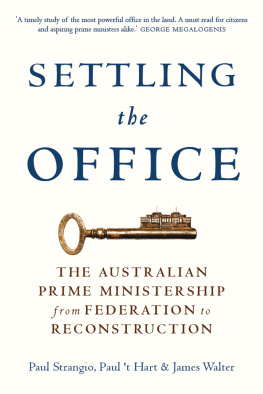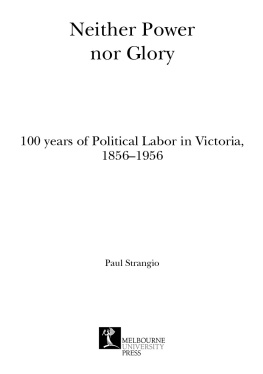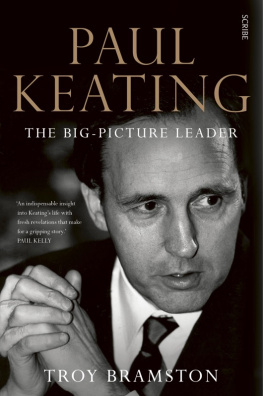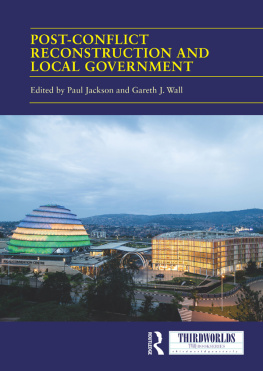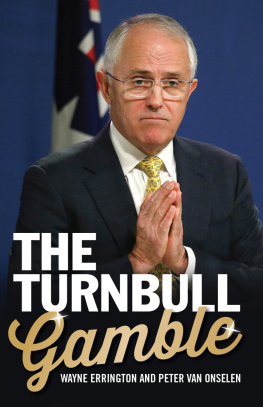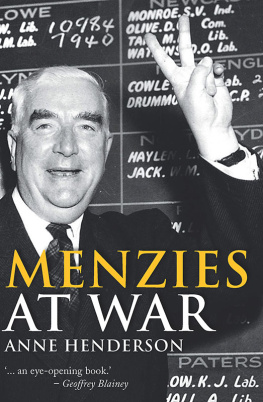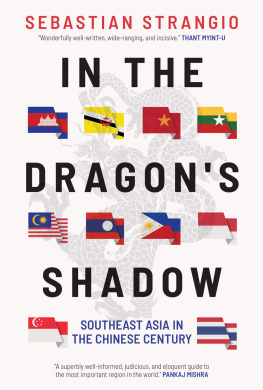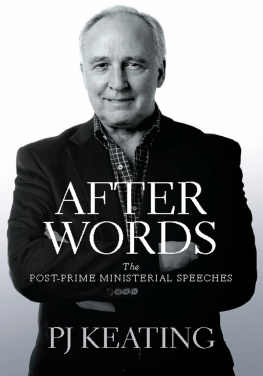Paul Strangio is Associate Professor of Politics in the School of Social Sciences at Monash University. A political historian and biographer, he has written extensively about political leadership and political parties in Australia. One of his recent books is Neither Power Nor Glory: 100 Years of Political Labor in Victoria, 18561956 (2012). Paul has also been a long-time commentator on Australian politics in the print and electronic media.
Paul 't Hart is Professor of Public Administration, Utrecht School of Governance, Utrecht University, the Netherlands. A former professor of political science at the Australian National University, since 2007 Paul has been a core faculty member of the Australia and New Zealand School of Government. He writes about political and public service leadership, crisis management, policy evaluation and public accountability. His latest book is Understanding Public Leadership (2014).
James Walter is Professor of Politics in the School of Social Sciences at Monash University and a Fellow of the Academy of Social Sciences in Australia. He has published widely on biography, political psychology, leadership, political thought and policy deliberation. His recent books include, Understanding Prime-Ministerial Performance: Comparative Perspectives (2013, with Paul Strangio and Paul 't Hart) and What Were They Thinking? The Politics of Ideas in Australia (2010).
THE MIEGUNYAH PRESS
An imprint of Melbourne University Publishing Limited
1115 Argyle Place South, Carlton, Victoria 3053, Australia
mup-info@unimelb.edu.au
www.mup.com.au
First published 2016
Text Paul Strangio, Paul 't Hart and James Walter, 2016
Design and typography Melbourne University Publishing Limited, 2016
This book is copyright. Apart from any use permitted under the Copyright Act 1968 and subsequent amendments, no part may be reproduced, stored in a retrieval system or transmitted by any means or process whatsoever without the prior written permission of the publishers.
Every attempt has been made to locate the copyright holders for material quoted in this book. Any person or organisation that may have been overlooked or misattributed may contact the publisher.
Alfred Deakin letter reproduced in the endpapers: Alfred Deakin to Sir Edmund Barton, 1900, Sir Edmund Barton Papers, National Library of Australia, MS51/1/719/s1.
Cover design by Design by Committee
Typeset in 11/15pt Minion by Cannon Typesetting
Printed in China by 1010 Printing International Ltd.
National Library of Australia Cataloguing-in-Publication entry
Strangio, Paul, author.
Settling the office: from federation to reconstruction/Paul Strangio,
Paul 't hart, James Walter.
9780522868722 (hardback)
9780522868739 (ebook)
Australian prime ministership; vol. 1.
Includes index.
Prime ministersAustraliaHistory.
PoliticiansAustraliaHistory.
AustraliaPolitics and governmentHistory.
Other Creators/Contributors: Hart, Paul 't, author.
Walter, James, 1949 author.
352.230994
Introduction
INVENTING THE PRIME MINISTERSHIP
D O WE FACE a crisis in our political leadership? Much of the contemporary commentary about the performance of prime ministers has encouraged this impression. There has been increasingly intense focus on leaders since the late twentieth century. As Graham Little observed in 1988, it is as if politics and its leaders have to fill a space left by God and religion.
This commentary also raised more fundamental questions. Are current prime ministers somehow different from (and inferior to) those who governed in the past? If so, how and why? Is the system truly in decline, and, if so, what has brought it low? And what, indeed, do we mean by the system? Are we merely talking about the office of prime minister and its performance? Or does it incorporate the executive more broadly defined? Parliament and parliamentary scrutiny? The parties? The public service? The changing nature and practices of the media? Does it perhaps even extend to the burgeoning and incessant chorus of public demands that are proving increasingly difficult to address as social identities fragment and globalisation erodes national autonomy? Indeed, combinations and interrelationships of all of the above are relevant. But at the heart of it all stands the prime minister and the office of the prime ministership. This office that has never seemed more omnipotent in the countrys life and yet paradoxically so brittle in the experience of recent incumbents. This office is the target on which so much of the publics disenchantment with politics is trained, and yet, in another paradox, there remains a resilient faith in its redemptive powers, as evinced by the yearning that resounds within the national political conversation for a prime-ministerial hero to guide us from our tribulations.

